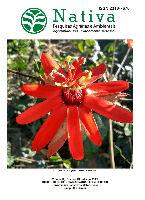
Nativa
Scope & Guideline
Championing open access to vital agricultural research.
Introduction
Aims and Scopes
- Biodiversity and Conservation:
Research focused on the conservation of biodiversity, including studies on flora and fauna, habitat restoration, and the impacts of human activities on ecosystems. - Agricultural Science and Practices:
Explorations of agricultural methods, crop management, and the effects of environmental factors on plant species, emphasizing sustainable agricultural practices. - Environmental Monitoring and Management:
Studies involving environmental assessments, climate change impacts, land use changes, and the management of natural resources to mitigate ecological degradation. - Biotechnology and Plant Physiology:
Investigations into plant biology, including genetic studies, biotechnological applications for crop improvement, and physiological responses of plants to various stressors. - Ecological Economics and Policy:
Analysis of the economic aspects of environmental conservation, agricultural policies, and the socio-economic impacts of agricultural practices on communities.
Trending and Emerging
- Climate Change and Agricultural Resilience:
A growing focus on the impacts of climate change on agricultural systems and the development of resilient practices to adapt to changing environmental conditions. - Agroecology and Sustainable Practices:
Increased attention to agroecological practices that promote sustainability, biodiversity, and ecological balance in agricultural systems. - Technological Innovations in Agriculture:
Emerging themes include the use of technology such as IoT, remote sensing, and precision agriculture to improve farming efficiency and environmental monitoring. - Microbial Interactions in Soil Health:
Research on the role of microbial communities in soil health and plant growth is gaining traction, emphasizing the importance of soil biology in sustainable agriculture. - Restoration Ecology:
An uptick in studies focused on ecological restoration efforts, examining methods to rehabilitate degraded ecosystems and enhance biodiversity.
Declining or Waning
- Traditional Pest Management Practices:
Research focusing on conventional methods of pest control is less prevalent, possibly due to a growing emphasis on integrated pest management and sustainable practices. - Invasive Species Studies:
While previously a significant area of focus, studies specifically targeting invasive species have decreased, potentially due to the broadening scope of ecological research. - Soil Chemistry and Fertility:
Investigations centered solely on soil chemistry have waned, as the journal increasingly highlights broader ecological interactions and sustainable farming practices. - Drought Resistance in Non-Crop Species:
Research on drought resistance in non-crop species has seen a decrease, possibly due to the growing focus on crop-related studies and agricultural resilience. - Historical Ecology Studies:
Research examining historical ecological conditions and changes has become less prominent, as current environmental challenges and solutions take precedence.
Similar Journals

Geography and Natural Resources
Innovating Solutions for a Sustainable PlanetGeography and Natural Resources is a vital academic journal published by MAIK NAUKA/INTERPERIODICA/SPRINGER, focusing on diverse aspects of geography, natural resource management, and environmental sciences. With its ISSN 1875-3728 and E-ISSN 1875-371X, the journal serves as a platform for scholars and researchers to disseminate their findings in a rapidly evolving field. The journal holds a respectable Q3 ranking in the categories of Earth-Surface Processes and Geography, Planning and Development, as well as a Q4 ranking in Management, Monitoring, Policy, and Law, reflecting its commitment to quality research. Although it is not an open-access journal, it offers valuable insights and impactful articles tailored for professionals and academics interested in the intersection of human and environmental systems. By bridging theoretical and practical applications, Geography and Natural Resources plays a crucial role in guiding policies and enhancing understanding of sustainable development from 2008 to 2024 and beyond, making it an indispensable resource for the global scholarly community.
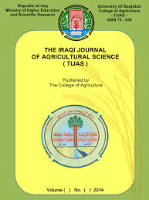
Iraqi Journal of Agricultural Sciences
Advancing agricultural innovation for a sustainable future.The Iraqi Journal of Agricultural Sciences, published by the College of Agricultural Engineering Sciences, University of Baghdad, is a prominent open-access journal that has been disseminating valuable research in the fields of agricultural and biological sciences since 2005. With an ISSN of 0075-0530 and an E-ISSN of 2410-0862, this journal serves as an essential platform for scholars to share their findings and advancements in various disciplines, including animal science, horticulture, and food science. Recognized for its excellence, the journal achieved Q1 ranking in multiple categories, reflecting its significant contribution to the scientific community and its impact within Scopus rankings. It is particularly dedicated to fostering research that addresses local and global agricultural challenges and promotes sustainable practices in Iraq and beyond. As a pivotal resource for researchers, professionals, and students alike, the Iraqi Journal of Agricultural Sciences invites submissions that advance our understanding of agricultural sciences while supporting the open dissemination of knowledge in this vital sector.
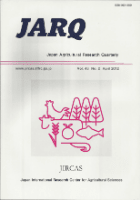
JARQ-JAPAN AGRICULTURAL RESEARCH QUARTERLY
Fostering Collaboration in Agricultural ResearchJARQ - Japan Agricultural Research Quarterly serves as a pivotal platform in the field of agricultural sciences, published by the esteemed Japan International Research Center for Agricultural Sciences. Established in 1973, this journal has a rich history and plays a critical role in disseminating significant research findings relevant to agronomy, crop science, animal science, ecology, and biotechnology. Despite its ranking in the lower quartiles, with impressive coverage from 1973 to 2024, it continues to attract contributions that enhance agricultural strategies and practices in Japan and beyond. The journal facilitates discussions that are essential for fostering innovation in agricultural methodologies and environmental sustainability. Accessible to a diverse audience, including researchers, academics, and practitioners, JARQ emphasizes the importance of advancing agricultural research and its implications for food security and ecological balance.
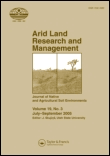
ARID LAND RESEARCH AND MANAGEMENT
Unlocking the potential of arid lands through research.ARID LAND RESEARCH AND MANAGEMENT is a leading journal in the field of Soil Science, published by Taylor & Francis Inc in the United Kingdom. With a focus on the sustainable management of arid and semi-arid lands, this journal aims to bridge the gap between scientific research and practical application. It garners a respectable impact factor, categorically positioned in the Q2 quartile within its field and ranks 59th out of 159 in Scopus, representing the top 63rd percentile of journals in Agricultural and Biological Sciences - Soil Science. As an essential resource for researchers, practitioners, and students alike, ARID LAND RESEARCH AND MANAGEMENT publishes high-quality, peer-reviewed articles that cover a wide range of topics, from soil conservation techniques to innovative land management practices. Open access options are available, facilitating broader dissemination of knowledge critical to addressing global challenges associated with arid environments. Targeting a pivotal area of study, this journal plays a significant role in advancing the understanding and management of these unique ecosystems, making it a valuable asset for anyone engaged in environmental sustainability.
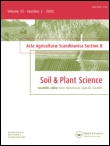
ACTA AGRICULTURAE SCANDINAVICA SECTION B-SOIL AND PLANT SCIENCE
Cultivating Knowledge for a Sustainable Agricultural FutureACTA AGRICULTURAE SCANDINAVICA SECTION B-SOIL AND PLANT SCIENCE, published by Taylor & Francis AS, is a distinguished journal dedicated to the fields of Agronomy, Crop Science, and Soil Science. With an impressive impact factor, and categorized in Q2 for both Agronomy and Crop Science and Soil Science as of 2023, this journal is an essential resource for researchers, professionals, and students aiming to advance their understanding of soil-plant interactions and sustainable agricultural practices. Operating since 1992 and continuing through to 2024, ACTA aims to publish high-quality, peer-reviewed research that encourages the applicability of advanced scientific knowledge in real-world agricultural settings. While the journal is not open access, it remains widely accessible through institutional subscriptions, reflecting its commitment to disseminating essential findings and fostering innovation in soil and plant science worldwide. Nestled in the vibrant academic environment of Norway, ACTA AGRICULTURAE SCANDINAVICA serves as a key platform for nurturing groundbreaking research that informs sustainable agricultural policies and practices globally.

PAKISTAN JOURNAL OF AGRICULTURAL SCIENCES
Empowering Agricultural Scholars with Vital InsightsWelcome to the Pakistan Journal of Agricultural Sciences, a prominent platform for disseminating vital research findings in the fields of agronomy, crop science, food science, plant science, and soil science. Published by the prestigious University of Agriculture in Faisalabad, this journal aims to enhance the scientific discourse surrounding agricultural innovation and sustainability in Pakistan and beyond. With an ISSN of 0552-9034 and E-ISSN of 2076-0906, the journal serves as a valuable resource for researchers, professionals, and students interested in cutting-edge agricultural developments. As of 2023, the journal is ranked in the Q3 category for Agronomy and Crop Science as well as Food Science and positioned in Q4 for Plant and Soil Science, highlighting its growing impact within a competitive academic landscape. While the Pakistan Journal of Agricultural Sciences is not currently open access, it provides a comprehensive archive of research converging from 2011 to 2024, ensuring that critical knowledge remains accessible to those striving to advance the agricultural sciences. Join us in our mission to foster innovation and support sustainable practices in agriculture.
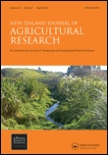
NEW ZEALAND JOURNAL OF AGRICULTURAL RESEARCH
Transforming Agriculture Through Peer-Reviewed ResearchNEW ZEALAND JOURNAL OF AGRICULTURAL RESEARCH is a prestigious, peer-reviewed journal published by Taylor & Francis Ltd that has been at the forefront of agricultural science since its inception in 1958. With a strong focus on the fields of Agronomy and Crop Science, Animal Science and Zoology, Plant Science, and Soil Science, this journal has established itself in the academic community, achieving a notable Q2 ranking in various agricultural categories as of 2023. The journal thrives on its commitment to disseminating cutting-edge research and innovative practices that address contemporary challenges in agriculture. Although it does not currently offer an open access option, its valuable contributions can be accessed through various academic platforms, ensuring that vital research reaches a wide audience of researchers, professionals, and students globally. The journal's continued relevance and authority are reflected in its strong Scopus rankings, further emphasizing its role as a critical journal within the agricultural sciences.

Plants-Basel
Elevating ecological understanding through rigorous scholarship.Plants-Basel is a distinguished open access journal published by MDPI since 2012, offering a comprehensive platform for researchers and professionals in the field of ecology, plant science, and evolutionary biology. Based in Switzerland, this journal has established itself as a leader in disseminating high-quality research, evident through its impressive rankings in multiple categories, including Q1 in Ecology and Plant Science for 2023. With a substantial impact factor and a dedicated focus on advancing our understanding of plant interactions, ecosystems, and sustainable practices, Plants-Basel is vital for scholars seeking to contribute to these critical fields. The journal's commitment to open access enhances visibility and accessibility, facilitating the widespread sharing of knowledge essential for addressing contemporary ecological challenges.
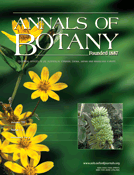
ANNALS OF BOTANY
Exploring the Depths of Plant Science Since 1887ANNALS OF BOTANY, published by Oxford University Press, stands as a leading journal in the field of Plant Science, with a distinguished history that dates back to 1887. This esteemed journal, recognized for its contribution to the advancement of botanical research, holds a prestigious Q1 quartile ranking in its category as of 2023. With a commitment to sharing high-quality, peer-reviewed research, ANNALS OF BOTANY provides a vital platform for researchers, professionals, and students to disseminate novel findings and engage in scholarly discourse. Although it does not currently offer open access options, the journal remains accessible to a wide academic audience, further cementing its role in facilitating the exchange of knowledge within the global botanical community. For those interested in the dynamic and evolving world of plant sciences, ANNALS OF BOTANY is an indispensable resource.

RENDICONTI LINCEI-SCIENZE FISICHE E NATURALI
Fostering Collaboration for Environmental and Biological SolutionsRENDICONTI LINCEI-SCIENZE FISICHE E NATURALI, published by SPRINGER-VERLAG ITALIA SRL, is a prestigious academic journal based in Italy, focusing on the interdisciplinary fields of Agricultural and Biological Sciences, Earth and Planetary Sciences, and Environmental Science. With an impressive track record dating back to its inception in 1990 and its continued publication up to 2024, this journal serves as a vital platform for researchers and professionals to disseminate significant findings that address pressing environmental and biological challenges. The journal is ranked in the second quartile (Q2) across three essential categories, affirming its influence and respect within the academic community, with Scopus rankings placing it in the top tiers of its field. Though not open access, RENDICONTI LINCEI provides valuable insights that contribute to advancements in scientific knowledge and practice, making it an essential resource for scholars aiming to engage with cutting-edge research and foster collaboration across disciplines.